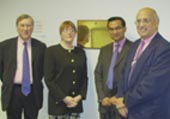Dr Raj Persaud delivers fourth Whittington Oration

Popular psychologist Dr Raj Persaud became the fourth esteemed medic to deliver the annual Whittington Oration on Thursday 24 November.
Dr Persaud, who began his medical career as a house officer at the Whittington over twenty years ago, presented a lecture on motivation amongst doctors, a subject of which he has had enormous experience during his work at the sick doctors unit at Londonís Maudsley hospital. In working with depressed and psychologically unwell doctors not only has he often found himself the recipient of attempted counter-sections in detaining them under the mental health act but he also found that it may be the very circumstances of their profession that are causing them to become unwell.
His discussion about the psychological state of doctors relied primarily on the idea that there are essentially two attitudes that people have to what they think determines their future. Those referred to as Externals see themselves as victims of circumstance, with outside influences effecting their actions and the choices they make, whereas Internals take responsibility not just for what happens to them but also how the affect the world around them. These people also tend to be the most motivated since they feel that they have influence. Dr Persaud sees that the majority of doctors fall into the latter category. However, since the 1960ís, psychologists have been tracking a shift in the balance of society from primarily consisting of Internals to one where the majority of people are Externals. Part of the problem that doctors face in the modern NHS is as Internals working in a system where they are continually the victims of circumstance and therefore share the experience of Externals; being asked to adhere to directives set out by the government of the day sets up conflict which in turn causes stress.
Secondary to this problem of feeling at odds with the system, doctors also tend to be affected by their attitude to time. Dr Persaud discussed that people tend to be either past-oriented, concentrating on the impact of past events on their current lives, present oriented, enjoying life and living purely for the moment, or future-oriented, concerned about the future effects of actions taken in the present. These latter people tend to worry. The type of people who become doctors tend to fall into this last category and their occupation compounds the problem since it is quite feasible that every time they treat a patient there may be negative future consequences. Dr Persaud continued that the current target-driven NHS system requires immediate results and therefore when doctors recognise that many of the directives put before them will not succeed in the long run, they find themselves even more at odds within their working environment.
He argued in order to counteract the relative powerlessness that the shift in focus within the system has created, doctors need to be more robust in the defence of their profession. This, he says, can be done through the use of the doctor Ė patient relationship. In the rush, he says, to perform to targets and to see as many patients as possible, the patient relationship has been neglected and support for the medical profession has therefore dwindled. Without the support of the public for the medical profession, doctors will lose their influence. The majority of complaints received in the NHS are as a result of the way doctors and other staff behave toward the patients. Patients are most likely to sue in revenge for a bad relationship rather than for bad medical management and one in three doctors who are going through litigation procedures will suffer with clinical depression. Therefore, to reassert the importance of the bedside manner has a twofold benefit, not only to reinforce the influence that doctors have over their working conditions, but also to defend the values of the Internal by ensuring that the future outcome of any interaction with patients will be as positive as possible. Not only will this change in behaviour have a beneficial outcome for the individual mental health of doctors, it may even change the system to one that benefits both doctors and patients alike.
After the lecture there was interesting discussion, with questions put to Dr Persaud by the chief executive David Sloman, the chair of the Strategic Health Authority, Marcia Saunders, doctors and medical students.

